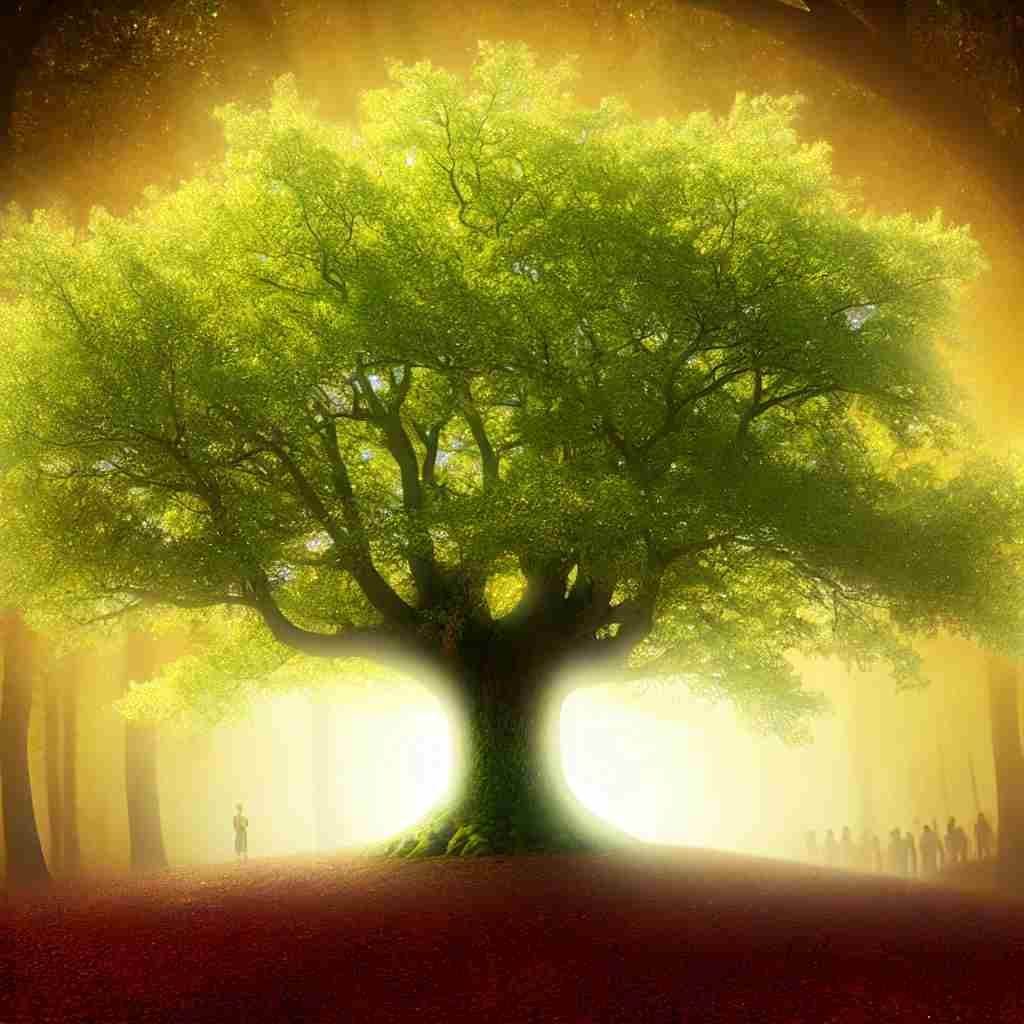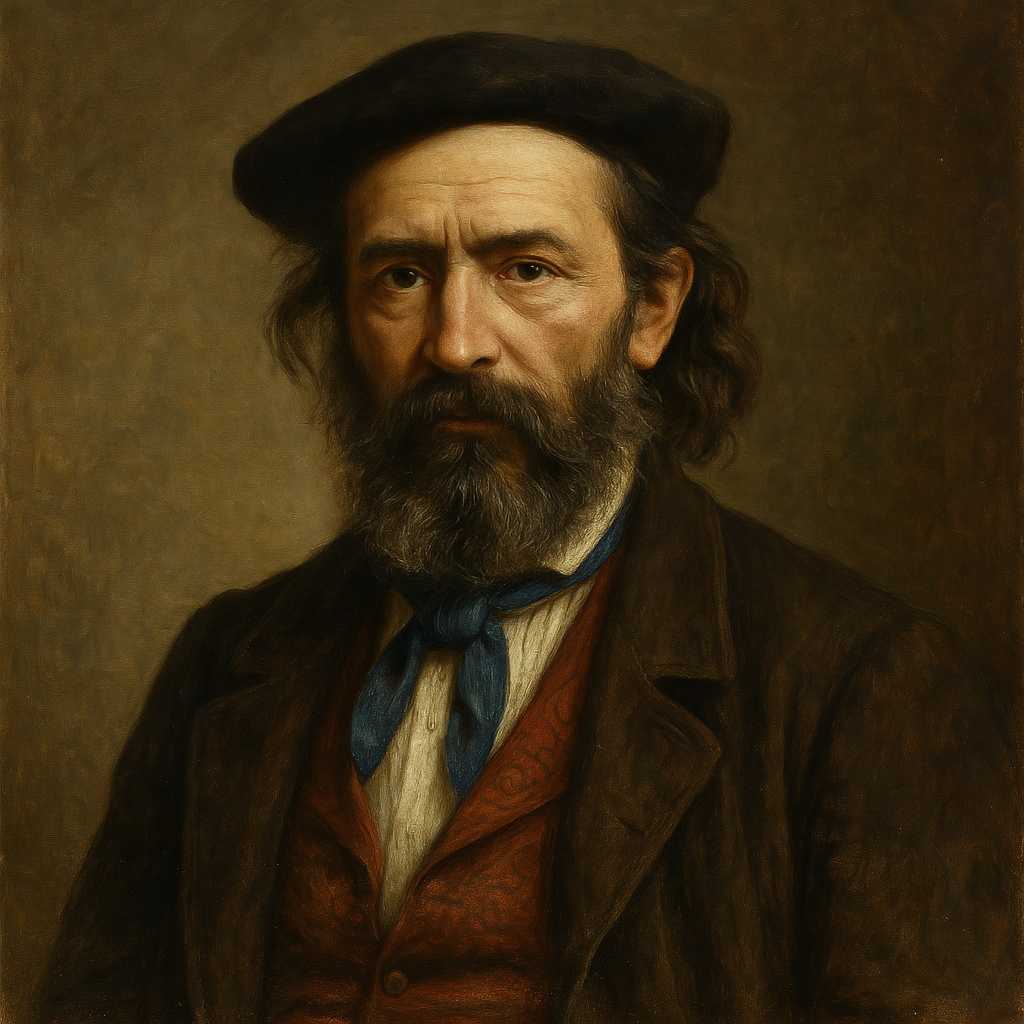The Tree of Gernika (Basque)
José María Iparraguirre
1820 to 1881

Gernikako Arbola
Gernikako arbola
da bedeinkatua,
euskaldunen artean
guztiz maitatua.
Eman ta zabal zazu
munduan frutua,
adoratzen zaitugu,
arbola santua.
Bizkaiko lur gorrian
zu zara bakarra,
zu zara bakarra,
gure askatasuna.
Eman ta zabal zazu
munduan frutua,
adoratzen zaitugu,
arbola santua.
Euzkotarren artean
guztiz maitatua,
zutik dago zuhaitz bat
guztiz maitatua.
Eman ta zabal zazu
munduan frutua,
adoratzen zaitugu,
arbola santua.
Jaungoikoak agintzen
duen argi hutsa,
zabaldu da munduan
zuk, zuhaitz maitea.
Eman ta zabal zazu
munduan frutua,
adoratzen zaitugu,
arbola santua.
Eman ta zabal zazu
munduan frutua,
adoratzen zaitugu,
arbola santua.
José María Iparraguirre's The Tree of Gernika
José María Iparraguirre's poem, "The Tree of Gernika" (Gernikako Arbola), is a poignant ode to the oak tree of Gernika, an emblem of the Basque people's heritage, unity, and enduring spirit. This poem, both in its original Basque and in English translation, celebrates the tree as a powerful symbol of identity and resilience. Known as the Gernikako Arbola, this oak has historically symbolized liberty and Basque sovereignty, as it stands near the location where Basque assemblies met to make decisions in a tradition that dates back centuries. The poem’s structure, with its repetition and invocation, mirrors the reverence the Basque people hold for this landmark.
Introduction
The poem opens by naming the Gernika tree as "blessed" and "beloved" by the Basque people, suggesting not only respect but deep-seated cultural and spiritual significance. Through metaphor, repetition, and a lyrical refrain, Iparraguirre weaves together ideas of freedom, resilience, and the intergenerational connection to the land and its symbols. Each stanza reinforces the tree's dual role as both a literal and metaphorical anchor for Basque identity.
Analysis
Stanza 1: The Sacred Tree
In the first stanza, Iparraguirre establishes the Gernika tree as "bedeinkatua" (blessed), immediately imbuing it with a near-sacred quality. By referring to the tree as "adoratzen zaitugu, arbola santua" (we honor you, holy tree), the poem elevates it from a natural object to a spiritual symbol. The tree becomes a point of unity and devotion for the Basque people, cherished "among Basques one and all." Here, the tree is not merely a symbol of nature; it is revered as a sacred entity that embodies collective memory and cultural continuity.
Refrain: Spreading Fruit to the World
The refrain, "Eman ta zabal zazu munduan frutua" ("Spread your boughs far and wide, with fruit the world to bless"), introduces the idea of expansiveness. Iparraguirre envisions the Gernika tree as a source of strength and moral guidance that transcends local importance to become a universal symbol. This line reflects a hopeful aspiration for the Basque spirit and ideals to influence the wider world, metaphorically sharing its "fruit" of liberty, resilience, and community. This notion of spreading fruit to the world also conveys an ecological message: just as the tree nourishes the land and people, Basque culture has something enriching to offer globally.
Stanza 2: The Solitary Emblem of Freedom
In the second stanza, the poem focuses on the tree as a unique and unyielding symbol within "Bizkaiko lur gorrian" ("Bizkaia’s rugged land"). The phrase "you stand alone, so free" emphasizes not only the tree's isolation but its steadfastness, mirroring the historical Basque struggle for autonomy and cultural survival. Here, the tree is framed as a "symbol firm and grand," linking it with the idea of endurance and steadfastness. This aligns with the Basque people's desire for self-determination and their historic resistance to external control.
Stanza 3: The Tree as a Unifying Force
The third stanza depicts the tree as "loved by the young and old" among the Basque, establishing it as a unifying force that transcends generations. The imagery of a "tree that holds us near" reinforces the idea of the Gernika tree as a metaphor for familial and cultural ties, suggesting that it provides shelter, strength, and continuity across time. Its "branches brave and bold" further symbolize the strength of the Basque community, suggesting that the tree—and by extension, the Basque people—will continue to stand tall despite adversity.
Stanza 4: Light from Above and Universal Embrace
The fourth stanza introduces a religious or transcendent tone with the line "As light from heaven above shines down on every place." Here, the tree’s growth and resilience are seen as part of a divine or natural order, and the "leaves of love" imply an inclusive message. By associating the tree with a universal love, the poem speaks to the aspiration that the Basque ideals of freedom, solidarity, and cultural pride might offer something meaningful to all of humanity. The tree's symbolism extends beyond Basque borders, suggesting an ideal of peace and unity among all people.
Conclusion
The Tree of Gernika by José María Iparraguirre is a stirring ode that embodies the spirit and values of the Basque people. Through the use of religious imagery, natural symbolism, and a refrain that envisions the tree’s branches spreading wide, Iparraguirre positions the Gernika oak as both a physical and cultural landmark. The tree is a protector and guide, bearing the fruit of Basque culture, resilience, and unity. Furthermore, by repeatedly calling for the tree to "spread its fruit to the world," the poem suggests that the Basque ideals of freedom, respect, and solidarity are not only local values but ones that can resonate globally.
This poem thus serves as both a celebration of Basque heritage and a hopeful message for universal peace and cultural coexistence, with the Gernika tree as a lasting symbol of endurance and unity. Through its simple structure and profound message, Iparraguirre’s work continues to resonate, reminding readers of the enduring power of cultural symbols to inspire and unify.
This text was generated by AI and is for reference only. Learn more
Want to join the discussion? Reopen or create a unique username to comment. No personal details required!



Comments
No comments yet. Be the first to comment!